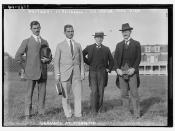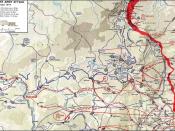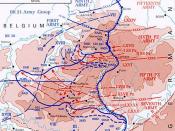Battle of the Bulge: Effects on the War
It is now late 1944; the Allies had gained a lot of momentum moving across Belgium. Allied landings in Normandy, on D-Day, were the start of the Allied campaign across northwest Europe. Now in their sights was the Rhineland. Hitler planned an offensive to retake the city of Antwerp, which he hoped would lead to quarreling between the Allied powers (Pimlott 14). This great battle will prove to be Hitler's last breath of command for the Germans. The capture of Antwerp would also slow their progress and allow for German regrouping.
Just when the Allies had become heady with victory, Hitler, in a desperate, bold move, threw most of his remaining armored reserves at them through the foggy, cold Ardennes. His gamble was to capture
enough gasoline to regain Liege and Antwerp. His plan, code-named Wacht am Rheim, depended on speed and accuracy.
Hitler thought he would utilize weather, so the deadly Allied air forces would be grounded. His plan was to time the annual clouding over and hard snow so his men would be shrouded during the attack. The major goals of the German offensive were to reach sea, trap four Allied armies and impel a negotiated peace on the western front. First, Hitler's goal was to severe American communication lines (Pimlott 17). The plan was to be put into action between the Aachan and southern Luxembourg area in France.
At 5:30 A.M on December 16, 1944 "pinpoints" of light were spotted on German lines, seconds later, shells crashed down and American soldiers realized it was the muzzle-flashes from hundreds of German guns (Goolrick 48). Hitler had ordered the Seventh, Fifth, and Sixth Panzer armies to attack over a seventy-five-mile front held by five U.S. divisions. The strike took the...



Very good research
This is a very well written report. Thanks for the opportunity to get it.
4 out of 4 people found this comment useful.